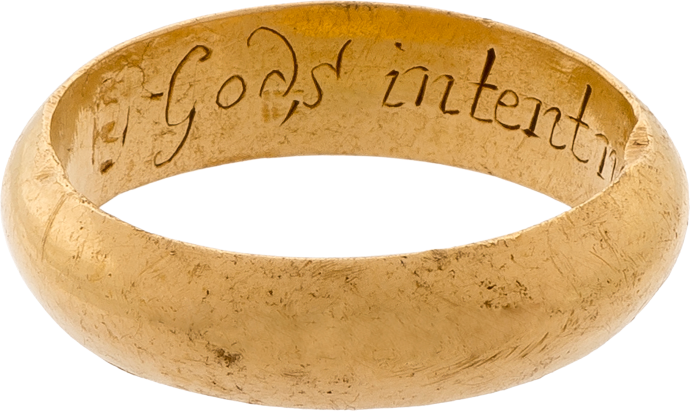


Posy Ring, "Gods intent none can prevent"
, 18th century


Posy Ring, "Gods intent none can prevent"
Description
'Posy rings', their name deriving from the term poesie or poetry, are rings with mottoes or inscriptions on a plain gold band, either in prose or verse. These often claim God as the origin of a giver's tender affections. Posy rings, such as this one, were likely to be used in ceremonies of betrothal and marriage, and God here refers to the sanctity of love within marriage. The use of an inscribed gold band as a marriage ring became particularly popular during the Commonwealth under the rule of Oliver Cromwell and his son (1649-1653 and 1659-1660) when the Puritans in England discouraged any form of extravagance and luxury such as wedding rings adorned with enamel and gemstones.
Wide gold band with D-section, plain on the exterior and on the interior is the finely engraved inscription in italic script "Gods intent none can prevent". Inside the hoop is the maker's mark "TI" in an oval punch and can tentatively be identified as Thomas Jackson II (registered 1769, see: Arthur G. Grimwade, London Goldsmiths 1697-1837. Their Marks and their Lives from the Original Registers at Goldsmiths' Hall & other sources, 3rd edition, London 1990, p. 200). The ring is in good wearable condition.
Literature:
Joan Evans in her compilation of posies records this motto in different variations ((Evans 1931, p. 44); one of them on a ring in the British Museum, London (Dalton 1912, no. 1178 and AF 1259) and the other in the Ashmolean Museum, Oxford (Taylor and Scarisbrick 1978, no. 552, AN 1933.1589 and a variant AN 1933.1603, both presented by Joan Evans).
For a history of posy rings with extensive list of posies, see Evans, 1931 and Anon., A Garland of Love: A Collection of Posy-Ring Mottoes, London 1907. For further information, see Dalton 1912, pp. 174 ff.; Scarisbrick 2007, pp. 74 ff., Taylor and Scarisbrick 1978, and Oman 1974, pp. 39 ff..